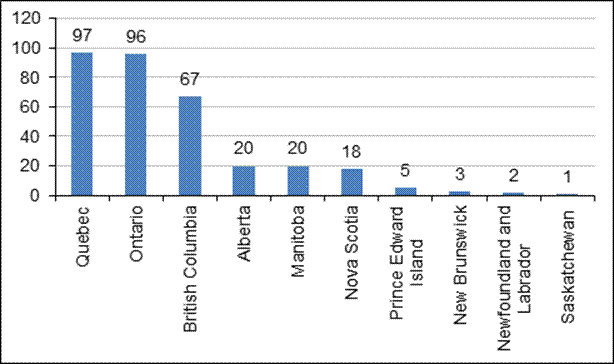INDU Committee Report
If you have any questions or comments regarding the accessibility of this publication, please contact us at accessible@parl.gc.ca.
CHAPTER 1: OVERVIEW OF THE CANADIAN VIDEO GAME INDUSTRY
A. From Humble Beginnings to a Growth Industry
Canada’s entertainment software industry is currently the 3rd largest in the world behind that of the United States and Japan in terms of employees, and ranks number one on a per-capita basis. The entertainment software industry generates about $2.3 billion in gross domestic product (GDP) annually in Canada. Much of the growth in this industry started in the 1990s due to a combination of factors.
Jonathan Lutz, Vice-President and Chief Financial Officer, Electronic Arts Inc. (EA), reminded the Committee of the small size of the Canadian video game industry in 1991. At that time, the company began its operations in Canada with the acquisition of Distinctive Software, a Canadian video game developer established in Burnaby, British Columbia. According to Mr. Lutz, EA’s decision to establish operations in Canada in the early 1990s was based mostly on the availability of strong talent within the greater Vancouver area and, to a lesser extent, the proximity of this location to EA’s headquarters in Redwood Shores, California. The favourable exchange rate between Canada and the United States that existed at that time also played a role.
Similar to EA’s experience in British Columbia, Nathalie Verge, Senior Advisor, Corporate Affairs, Ubisoft Entertainment Inc., told the Committee that the availability of a large pool of artistic talent, bilingual workers, the cluster of telecommunications and software development companies, and the creation of a Quebec payroll tax credit for the video game industry in 1996 motivated their company to open a studio in Montréal in 1997. According to Geneviève Poulin, Advisor, Corporate Affairs, Ubisoft Entertainment Inc., that studio employs 2,650 people and is currently the firm’s largest in the world. The Committee also learned that Ubisoft was planning to create 500 additional jobs over the next 7 years. Also on the subject of future growth plans, Martin Carrier, Vice-President and Studio Head, Warner Brothers Games Montréal, noted that Warner Brothers intended to grow its labour force in Montréal by 100 workers by 2018.
Jayson Hilchie, President and Chief Executive Officer, Entertainment Software Association of Canada, summarized the success of the Canadian video game industry as follows:
Canada has had tremendous success in the past with big budget video game blockbusters and we're known the world over for franchises like NHL and FIFA, Mass Effect, Assassin's Creed, Splinter Cell, and Batman: Arkham Origins, to name just a few. We're also well known for successful indie titles and critically acclaimed games that are enjoyed the world over. We've seen tremendous growth in this sector over the past few years.
While also acknowledging Canada’s past successes, Jason Della Rocca, Chief Executive Officer, Execution Labs, cautioned that the Canadian video game industry was still vulnerable to downturns in the economic cycle, as exemplified when Vancouver lost about half of its workforce during the economic crisis of 2008. Mr. Hilchie articulated that the global entertainment software market is estimated at $77 billion for 2014 and is predicted to reach $100 billion by 2018, which is bigger than box office revenues for movies worldwide.
B. Facts and Figures on the Industry
As illustrated in Figure 1, there were a total of 329 video game companies in Canada in 2013 and most of these companies were located in Quebec, Ontario and British Colombia.
Figure 1 – Number of Video Game Companies Operating in Canada by Province, 2013

Source: Entertainment Software Association of Canada, 2013 Essential Facts about the Canadian Video Game Industry, document submitted to the Committee on 5 March 2014.
According to a document entitled 2013 Essential Facts about the Canadian Video Game Industry that was submitted to the Committee by the Entertainment Software Association of Canada, in 2013, 88% of companies were either micro companies with 0 to 4 employees or small companies with 5 to 99 employees; the remaining 12% of companies were large companies, with 100 employees or more. Donald Henderson, President and Chief Executive Officer, Interactive Ontario, also indicated that the large companies that make video games for personal computers (PCs) and consoles such as Xbox and PlayStation are usually located in Montréal and Vancouver, while many of the micro and small companies that make games for smart phones and tablets are located in Ontario. Only 4% of Ontario’s digital media companies are currently considered large companies. He also expressed the view that Ontario’s video game companies tend to be very entrepreneur-driven given their smaller size.
As presented in Figure 2, with 8,750 employees, Quebec accounted for 53.0% of the employment in the Canadian video game industry in 2013, followed by British Columbia with 5,150 employees (31.2%) and Ontario with 1,850 employees (11.2%). Mr. Hilchie noted that the average age of employees working in the Canadian video game industry was 31 in 2012 and that their average salary for that year was $72,000.
Figure 2 – Number of Employees Working in the Canadian Video Game Industry by Province, 2013

Source: Entertainment Software Association of Canada, 2013 Essential Facts about the Canadian Video Game Industry, document submitted to the Committee on 5 March 2014.
Noting the significant decline in the demand for Canadian actors in films and television over the past years, Simon Peacock, member, Alliance of Canadian Cinema, Television and Radio Artists – National, emphasized the great employment opportunities that are generated by the Canadian video game industry:
Video games to a large extent have picked up that slack for a lot of performers. It's almost like a safety net for Canadian culture in many ways. If you value the arts, such as the theatre, video games now are largely subsidizing that. I can tell you that most of the actors who I work with also do theatre, but it doesn't pay the rent very well anymore, unfortunately.
For his part, Mr. Hilchie stressed that the Canadian video game industry comprises and fosters a unique mix of artistic, technological and commercial skill sets such as visual effects, game and sound design, motion or performance capture, computer programming, narrative development and marketing, which produce truly innovative products. He also suggested that such skills are highly transferable and can be used by other sectors of the Canadian knowledge economy to generate additional innovation.